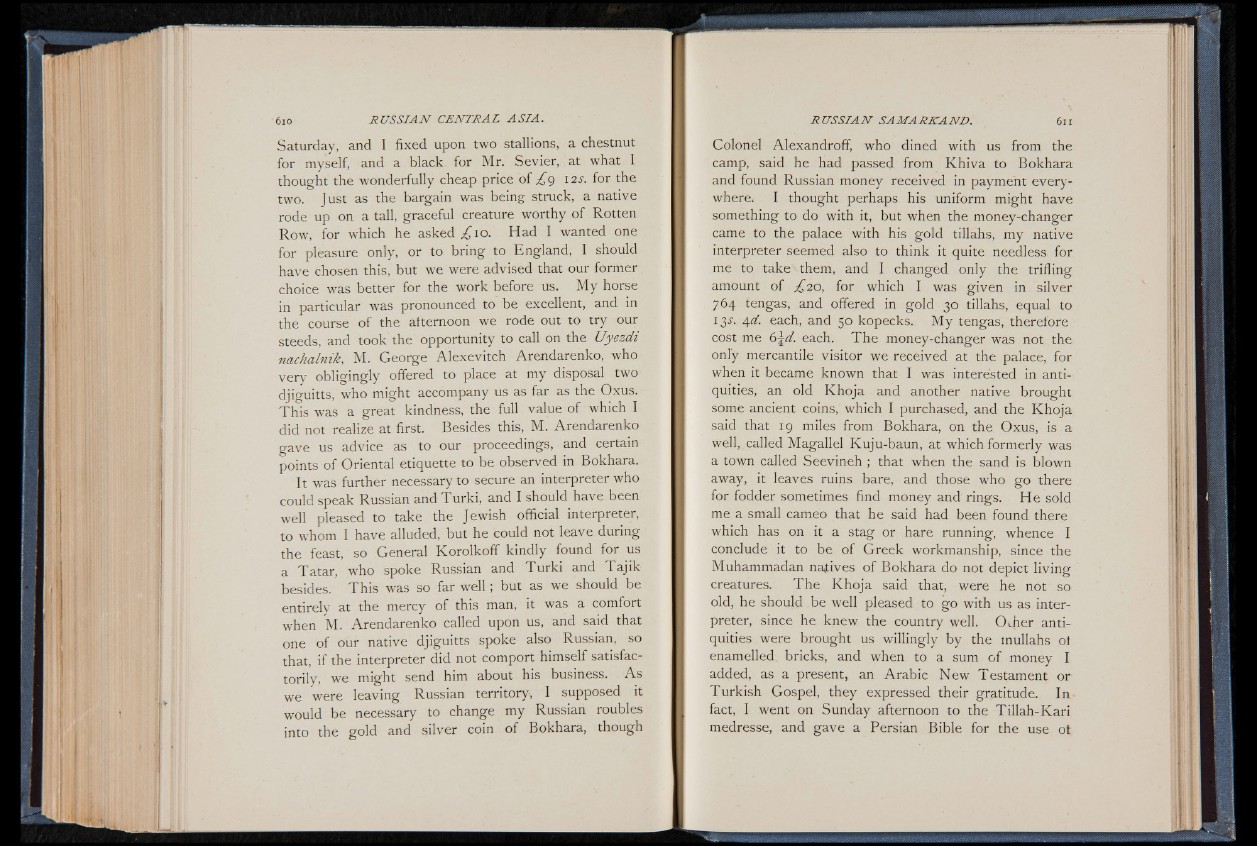
Saturday, and I fixed upon two stallions, a chestnut
for myself, and a black for Mr. Sevier, at what I
thought the wonderfully cheap price of £ g 12s. for the
two. Just as the bargain was being struck, a native
rode up on a tall, graceful creature worthy of Rotten
Row, for which he asked £10. Had I wanted one
for pleasure only, or to bring to England, I should
have chosen this, but we were advised that our former
choice was better for the work before us. My horse
in particular was pronounced to be excellent, and in
the course of the afternoon we rode out to try our
steeds, and took the opportunity to call on the Uyezdi
nachalnik, M. George Alexevitch Arendarenko, who
very obligingly offered to place at my disposal two
djiguitts, who might accompany us as far as the Oxus.
This was a great kindness, the full value of. which I
did not realize at first. Besides this, M. Arendarenko
gave us advice as to our proceedings, and certain
points of Oriental etiquette to be observed in Bokhara.
It was further necessary to secure an interpreter who
could speak Russian and Turki, and I should have been
well pleased to take the Jewish official interpreter,
to whom I have alluded, but he could not leave during
the feast, so General Korolkoff kindly found for us
a Tatar, who spoke Russian and Turki and Tajik
besides. This was so far w e ll; but as we should be
entirely at the mercy of this man, it was a comfort
when M. Arendarenko called upon us, and said that
one of our native djiguitts spoke also Russian, so
that, if the interpreter did not comport himself satisfac-
tori 1 y, we might send him about his business. As
we were leaving Russian territory, I supposed it
would be necessary to change my Russian roubles
into the gold and silver coin of Bokhara, though
Colonel Alexandroff, who dined with us from the
camp, said he had passed from Khiva to Bokhara
and found Russian money received in payment everywhere.
I thought perhaps his uniform might have
something to do with it, but when the money-changer
came to the palace with his gold tillahs, my native
interpreter seemed also to think it quite needless for
me to take them, and I changed only the trifling
amount of £20, for which I was given in silver
764 tengas, and offered in gold 30 tillahs, equal to
13^. 4d. each, and 50 kopecks. My tengas, therefore
cost me 6\d. each. The money-changer was not the
only mercantile visitor we received at the palace, for
when it became known that I was interested in antiquities,
an old Khoja and another native brought
some ancient coins, which I purchased, and the Khoja
said that 19 miles from Bokhara, on the Oxus, is a
well, called Magallel Kuju-baun, at which formerly was
a town called Seevineh ; that when the sand is blown
away, it leaves ruins bare, and those who go there
for fodder sometimes find money and rings. He sold
me a small cameo that he said had been found there
which has on it a stag or hare running, whence I
conclude it to be of Greek workmanship, since the
Muhammadan natives of Bokhara do not depict living
creatures. The Khoja said that, were he not so
old, he should be well pleased to go with us as interpreter,
since he knew the country well. Other antiquities
were brought us willingly by the mullahs ot
enamelled, bricks, and when to a sum of money I
added, as a present, an Arabic New Testament or
Turkish Gospel, they expressed their gratitude. In
fact, I went on Sunday afternoon to the Tillah-Kari
medresse, and gave a Persian Bible for the use ot